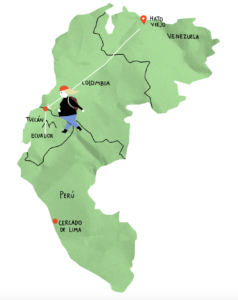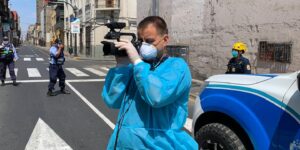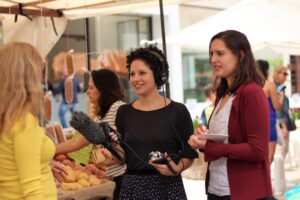Childbirth during migration, the Zika epidemic and the COVID-19 pandemic were the themes recognized in the ninth edition of the Roche Prize for Health Journalism, which awards health coverage in Latin America.
‘Huir Migrar Parir’ (Flee, migrate, give birth) by Distintas Latitudes, La vida de Nos, Mutante and GK, was the winning work in the Written Journalism category; ‘COVID-19: 100 días de la pandemia del coronavirus’ (COVID-19: 100 days of the coronavirus pandemic) from Peruvian newspaper El Comercio won in the Audiovisual Journalism category; and the series ‘Epidemia’ (Epidemic) of the podcast 37 Graus, in alliance with Folha de S. Paulo, took first place in the Daily Coverage category.
LatAm Journalism Review (LJR) spoke with the leaders of each of these investigations to learn about their journalistic processes, their impressions when they found out the winners and their future plans.
Huir Migrar Parir (Flee, migrate, give birth)
The work ‘Huir Migrar Parir’ tells the story of Marian Gutiérrez, a young Venezuelan who left Hato Viejo, a small town in Yaracuy, Venezuela, traveled more than 2,400 miles by land and crossed three borders to give birth to her son in Lima, Peru.

Screenshot from the report "Huir Migrar Parir"
The investigation shows how the medical and hospital system in Venezuela does not guarantee safe deliveries in their maternity wards. In addition, the story travels the main migrant routes, crossings and border cities that Venezuelans use while delving into the sexual and reproductive rights of migrants.
"The most complex element was being able to put together all the reporting that had been done and turn it into a story that was attractive and that was precisely what the award jury recognized," María Laura Chang, coordinator of the work, told LJR. Thirty-five journalists, editors, photographers, designers and network analysts from Venezuela, Colombia, Ecuador, Peru, Mexico and Argentina participated in the project.
The winning work had the financial support of the Gabo Foundation and Oxfam.
“It is rare for traditional media to fund investigations related to access to sexual and reproductive rights. In order to make these issues visible, it is usually necessary to look for external financing,” Chang said.
The investigative team is very honored by the distinction and motivated by the new collaborative work to come.
“These awards are a loudspeaker for the issues we feminist journalists address that have to do with women's rights. For me, making these realities visible is worth everything," Chang added.
COVID-19: 100 días de la pandemia del coronavirus (COVID-19: 100 days of the coronavirus pandemic)
The work ‘COVID-19: 100 días de la pandemia del coronavirus’ is a documentary that shows the impact of COVID-19 in Peru from the first case reported by the government on March 6, 2020 through the first hundred days.
The documentary exposes and contrasts the decisions of the State with reality.
"The work is not only about showing impactful images, but also about pointing out those responsible and makes visible how those who at one time were applauded as heroes (policemen and doctors) became victims due to the erred policies of the State," the jury record stated.
The jury also highlighted the reporting on the street and the proximity to the events.
LJR interviewed Rudy Jordán Espejo, director of the documentary, who explained how they managed to maintain journalistic rigor despite the fear of getting infected or losing their loved ones.
“Risk is part of journalism and I think those of us who practice this profession know it. That level of risk, in this case, was a difficulty that we used to be more alert and tell the story we felt. Of course, in a pandemic that fear is exponential, but happily we had the necessary protective equipment, the support of our families and the maximum possible care,” Jordán Espejo said.

Rudy Jordán (Cortesía)
Likewise, Jordán Espejo said that in 2016 he was in Cuba when Fidel Castro died and there he was able to observe how "events reveal various aspects of social reality that are usually hidden." The journalist sensed that something similar could happen with the arrival of the pandemic in Peru and decided to start on the documentary.
This award is received as an incentive to continue producing and with the satisfaction that the work was done well, that the idea could be captured and communicated.
“There are invisible prizes throughout the process, such as that one of the stories published in the documentary, that of Jacqueline Párraga, helped her receive donations and to be able to continue cooking for the poor people who were left without food because of the closure of everything in quarantine. In the age of the image in which we live, I believe that the audiovisual done with honesty and integrity can be a true instrument of change,” Jordán Espejo said.
Epidemia (Epidemic)
The series ‘Epidemia,’ in podcast format, began production in 2019 and started as an investigation into the Zika epidemic in Brazil. When the COVID-19 pandemic arrived in March 2020, the series was confronted with a twist and relevant material about this new virus was included.
“The main challenge we had was the unpredictability of it all. We didn’t know we were going to launch a series about an epidemic right when a new pandemic started to rip through the globe,” Sarah Azoubel, presenter and producer of the podcast 37 Graus, which published the series, told LJR.
"We released the first episode a week before COVID restrictions started in the state of São Paulo, where we live. So we were very quickly forced to adapt our production. Suddenly, it didn’t make sense to talk about Zika without also talking about COVID,” Azoubel said.

Integrantes de 37 Graus podcast (Cortesía)
Other details at a technical level also had to be modified. The series team had to start working remotely, conducting Zoom interviews and improvising small recording studios at home.
Azoubel and her co-worker, Bia Guimarães, are happy and honored by the award.
“It’s certainly been a tough and eventful year for reporting on health and science-related stories. And we know the other finalists had really great pieces, so we are incredibly honored that Epidemia was picked as the winner,” the science journalist said.
Her future plans include continuing to publish stories on the 37 Graus podcast and staying faithful to her slogan "Podcasts that tell stories with one foot in science."
“After Epidemia, we published our 4th season ‘Tempo’ (Time). And now we are in the middle of releasing our 5th season, called ‘Na esquina da realidade’ (On the corner/intersection of reality - something like that). In this new season, we explore stories about things that are on the edge between real and not real,” Azoubel said. “We are also working on a new exciting collaboration for a special series next year. And soon we will start production of our next regular season."
Honorable mentions
The contest also grants an honorable mention in Access to Health, in each of the categories in the contest. According to the prize, this mention goes to “the journalistic work with the best coverage of the gaps and challenges to be overcome in relation to access to services, awareness of diseases, late diagnosis, deficiencies in health infrastructure, among others, as well as works that investigate processes and results of the different responses to challenges of access to health in Latin America."
‘El consuelo de un país en crisis recae en sus estudiantes de psicología’ (The consolation of a country in crisis falls on its psychology students) from Ecuadorian media GK received mention in the Written Journalism category; ‘Los derechos no se aíslan’ (Rights are not isolated) from Chicas Poderosas received a mention in the Audiovisual Journalism category; ‘Morir en Nicaragua en tiempos de coronavirus’ (Dying in Nicaragua in times of coronavirus), by the Confidencial journalistic team, and ‘Coronavirus en Venezuela,’ by Mariana Souquett, published in Efecto Cocuyo, received mentions in the Daily Coverage category.
The Roche Prize also provides honorable mentions in Solutions Journalism and Journalistic Coverage of COVID-19.
In the case of Solutions Journalism, ‘Indústria da saúde no Ceará’ (Health industry in Ceará) was selected as the winner, a series of reports produced by the O Povo Online team in Brazil. For its part, the honorable mention in Journalistic Coverage of COVID-19 was taken by the work ‘Sequelas da Covid-19’ (Sequels to COVID), by VivaBem - UOL of Brazil.